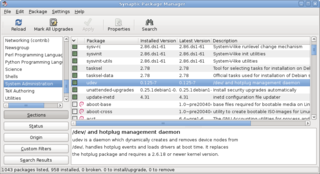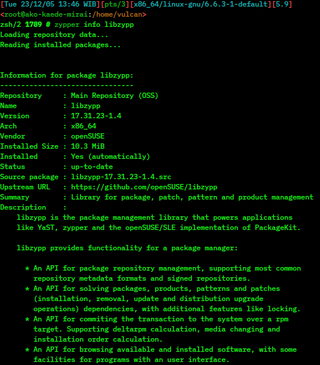Related Research Articles

Slackware is a Linux distribution created by Patrick Volkerding in 1993. Originally based on Softlanding Linux System (SLS), Slackware has been the basis for many other Linux distributions, most notably the first versions of SUSE Linux distributions, and is the oldest distribution that is still maintained.

A package manager or package-management system is a collection of software tools that automates the process of installing, upgrading, configuring, and removing computer programs for a computer in a consistent manner.

Advanced package tool, or APT, is a free-software user interface that works with core libraries to handle the installation and removal of software on Debian, and Debian-based Linux distributions. APT simplifies the process of managing software on Unix-like computer systems by automating the retrieval, configuration and installation of software packages, either from precompiled files or by compiling source code.
dpkg is the software at the base of the package management system in the free operating system Debian and its numerous derivatives. dpkg is used to install, remove, and provide information about .deb packages.

Portage is a package management system originally created for and used by Gentoo Linux and also by ChromeOS, Calculate, Sabayon, and Funtoo Linux among others. Portage is based on the concept of ports collections. Gentoo is sometimes referred to as a meta-distribution due to the extreme flexibility of Portage, which makes it operating-system-independent. The Gentoo/Alt project was concerned with using Portage to manage other operating systems, such as BSDs, macOS and Solaris. The most notable of these implementations is the Gentoo/FreeBSD project.

Arch Linux is an independently developed, x86-64 general-purpose Linux distribution that strives to provide the latest stable versions of most software by following a rolling-release model. The default installation is a minimal base system, configured by the user to only add what is purposely required.

Ubuntu is a Linux distribution based on Debian and composed mostly of free and open-source software. Ubuntu is officially released in multiple editions: Desktop, Server, and Core for Internet of things devices and robots. The operating system is developed by the British company Canonical, and a community of other developers, under a meritocratic governance model. As of October 2023, the most-recent release is 23.10, and the current long-term support release is 22.04.
Puppy Linux is an operating system and family of light-weight Linux distributions that focus on ease of use and minimal memory footprint. The entire system can be run from random-access memory (RAM) with current versions generally taking up about 600 MB (64-bit), 300 MB (32-bit), allowing the boot medium to be removed after the operating system has started. Applications such as AbiWord, Gnumeric and MPlayer are included, along with a choice of lightweight web browsers and a utility for downloading other packages. The distribution was originally developed by Barry Kauler and other members of the community, until Kauler retired in 2013. The tool Woof can build a Puppy Linux distribution from the binary packages of other Linux distributions.
Maven is a build automation tool used primarily for Java projects. Maven can also be used to build and manage projects written in C#, Ruby, Scala, and other languages. The Maven project is hosted by The Apache Software Foundation, where it was formerly part of the Jakarta Project.

Git is a distributed version control system that tracks changes in any set of computer files, usually used for coordinating work among programmers who are collaboratively developing source code during software development.
A software repository, or repo for short, is a storage location for software packages. Often a table of contents is also stored, along with metadata. A software repository is typically managed by source or version control, or repository managers. Package managers allow automatically installing and updating repositories, sometimes called "packages".
This is a comparison of notable free and open-source configuration management software, suitable for tasks like server configuration, orchestration and infrastructure as code typically performed by a system administrator.

Apache Ivy is a transitive package manager. It is a sub-project of the Apache Ant project, with which Ivy works to resolve project dependencies. An external XML file defines project dependencies and lists the resources necessary to build a project. Ivy then resolves and downloads resources from an artifact repository: either a private repository or one publicly available on the Internet.

ZYpp is a package manager engine that powers Linux applications like YaST, Zypper and the implementation of PackageKit for openSUSE and SUSE Linux Enterprise. Unlike some more basic package managers, it provides a satisfiability solver to compute package dependencies. It is a free and open-source software project sponsored by SUSE and licensed under the terms of the GNU General Public License v2 or later. ZYpp is implemented mostly in the programming language C++.

RPM Package Manager (RPM) is a free and open-source package management system. The name RPM refers to the .rpm file format and the package manager program itself. RPM was intended primarily for Linux distributions; the file format is the baseline package format of the Linux Standard Base.
Haskell is a general-purpose, statically-typed, purely functional programming language with type inference and lazy evaluation. Designed for teaching, research, and industrial applications, Haskell has pioneered a number of programming language features such as type classes, which enable type-safe operator overloading, and monadic input/output (IO). It is named after logician Haskell Curry. Haskell's main implementation is the Glasgow Haskell Compiler (GHC).

Homebrew is a free and open-source software package management system that simplifies the installation of software on Apple's operating system, macOS, as well as Linux. The name is intended to suggest the idea of building software on the Mac depending on the user's taste. Originally written by Max Howell, the package manager has gained popularity in the Ruby on Rails community and earned praise for its extensibility. Homebrew has been recommended for its ease of use as well as its integration into the command-line interface. Homebrew is a member of the Open Source Collective, and is run entirely by unpaid volunteers.

npm is a package manager for the JavaScript programming language maintained by npm, Inc. npm is the default package manager for the JavaScript runtime environment Node.js and is included as a recommended feature in the Node.js installer.
In version-control systems, a monorepo is a software-development strategy in which the code for a number of projects is stored in the same repository. This practice dates back to at least the early 2000s, when it was commonly called a shared codebase. Google, Meta, Microsoft, Uber, Airbnb, and Twitter all employ very large monorepos with varying strategies to scale build systems and version control software with a large volume of code and daily changes.
References
- ↑ "stack 0.1 released". FP Complete. Retrieved 13 January 2016.
- ↑ "Release v2.7.1". GitHub repository commercialhaskell/stack. Retrieved 11 Jun 2021.
- ↑ "Stackage Server". FP Complete. Retrieved 13 January 2016.
- ↑ "Haskell Communities and Activities Report Thirty Second Edition — May 2017" (PDF). Mihai Maruseac. Retrieved 2017-08-10.
- ↑ "Why is stack not cabal?" . Retrieved 27 January 2016.
This blog post is intended to answer two very frequest[ sic ] questions about stack: how is it different from Cabal? And: Why was it developed as a separate project instead of being worked on with Cabal?
- ↑ "What do Haskellers want? Over a thousand tell us" . Retrieved 13 January 2016.
Package management with cabal is the single worst aspect of using Haskell. Asked if improvements to package management would make a difference to their future choice of Haskell for a project, 38% said it would be "crucial" and a further 29% said it would be "important". Comments connected cabal with words like hell, pain, awful, sucks, frustrating, and hideous. Only this topic showed such grave dissatisfaction.